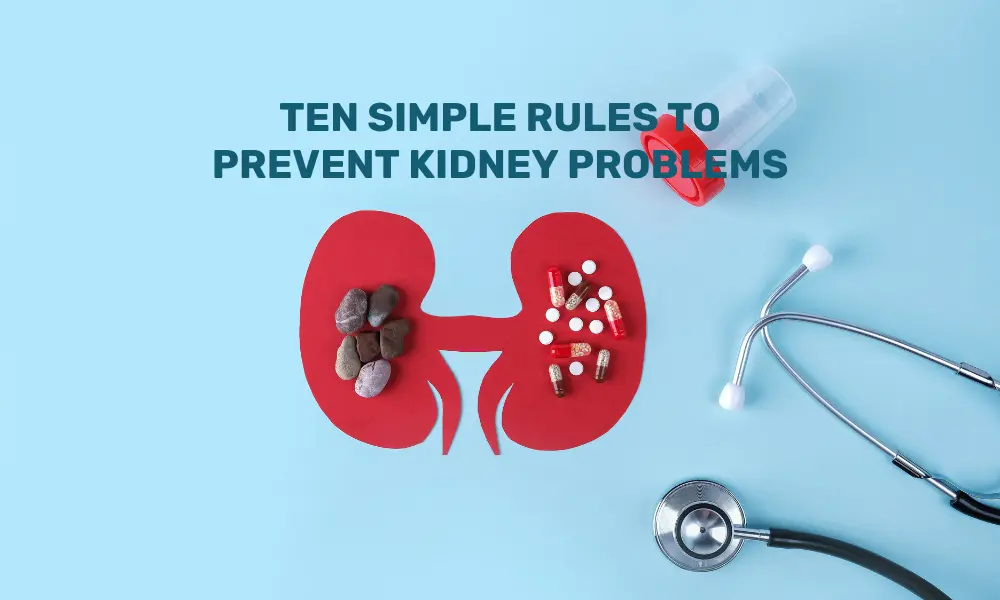Our kidneys are one of the major organs in our body. Maintaining kidney health is, therefore, vital for overall well-being. Kidney problems can significantly impact our quality of life, so adopting preventive measures early on is essential.
Types of Kidney Diseases
-
Chronic kidney disease
-
Urinary tract infection
-
Kidney stones
-
Polycystic kidney disease
-
Lupus nephritis
Ten rules to prevent kidney problems
Here are some golden rules to safeguard our kidneys and keep them functioning optimally.
-
Staying hydrated: Staying hydrated is crucial for kidney health. Water helps kidneys remove the excretory waste from our body, preventing the formation of kidney stones and urinary tract infections. One must aim to drink at least 6-8 glasses of water per day, or more if you’re physically active or in a hot climate.
-
Balanced diet: A healthy and nutritious diet is important in preventing kidney problems. One must include plenty of fruits, vegetables, whole grains, and lean proteins in their meals. Further, individuals must limit their intake of processed foods, saturated fats, sugar, and salt, as these can strain the kidneys over time.
-
Blood pressure: High BP can damage the kidneys over time, leading to various complications. Keep your blood pressure in check by adopting a low-sodium diet, exercising regularly, managing stress, and taking prescribed medications if necessary.
-
Exercise regularly: Physical activity is beneficial for overall health, including kidney health. Aim for at least 150 minutes of moderate or 75 minutes of vigorous-intensity exercise per week. Incorporate activities you enjoy, such as walking, swimming, or cycling, into your routine.
-
Manage blood sugar: Diabetes is a leading cause of kidney disease. If you have diabetes, it’s crucial to manage blood sugar levels effectively through diet, exercise, medication, managing stress, and regular monitoring. Maintaining the blood sugar within a healthy range can lower the risk of kidney damage.
-
Avoid overuse of painkillers: Certain over-the-counter pain medications, such as NSAIDs (non-steroidal anti-inflammatory drugs), can harm the kidneys if used excessively or over a prolonged period. Always follow the recommended dosage instructions and consult doctor if you need pain relief regularly.
-
Limit alcohol consumption: Excessive alcohol consumption can harm the kidneys and liver, leading to various health issues. Limit your alcohol intake to moderate levels – no more than one drink per day for women and two drinks per day for men.
-
Maintain a healthy weight: Being overweight or obese increases the risk of developing kidney problems, as it strains the kidneys and other organs. Aim to achieve and maintain a healthy weight through a combination of balanced diet and regular exercise.
-
Quit smoking: Smoking not only harms your lungs but also damages your kidneys. Nicotine and other harmful chemicals in cigarettes can impair kidney function and increase the risk of kidney disease. If you smoke, seek support to quit and avoid exposure to second-hand smoke.
-
Get regular check-ups: Regular health check-ups are essential for detecting and managing any potential kidney problems early on. Schedule regular appointments with your healthcare provider to monitor your kidney function, blood pressure, and overall health.
Maintaining kidney health requires adopting a series of sustainable lifestyle changes. While these ten rules can help maintain good kidney health, it is crucial to consult a doctor in case of frequent urine infection or kidney related issues.





